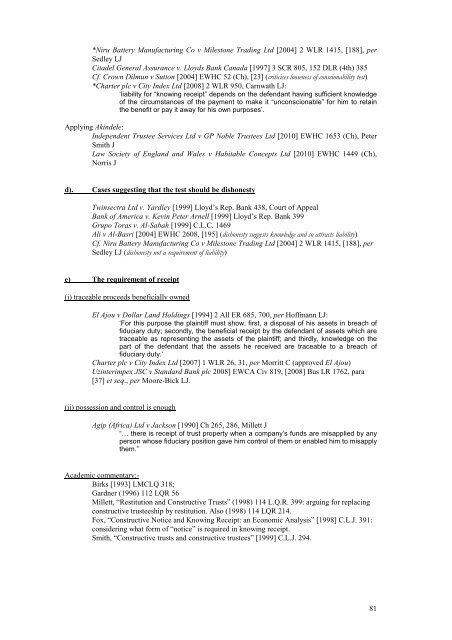Soton Equity and Trusts - alastairhudson.com
Soton Equity and Trusts - alastairhudson.com
Soton Equity and Trusts - alastairhudson.com
You also want an ePaper? Increase the reach of your titles
YUMPU automatically turns print PDFs into web optimized ePapers that Google loves.
*Niru Battery Manufacturing Co v Milestone Trading Ltd [2004] 2 WLR 1415, [188], per<br />
Sedley LJ<br />
Citadel General Assurance v. Lloyds Bank Canada [1997] 3 SCR 805, 152 DLR (4th) 385<br />
Cf. Crown Dilmun v Sutton [2004] EWHC 52 (Ch), [23] (criticises looseness of conscionability test)<br />
*Charter plc v City Index Ltd [2008] 2 WLR 950, Carnwath LJ:<br />
‘liability for “knowing receipt” depends on the defendant having sufficient knowledge<br />
of the circumstances of the payment to make it “unconscionable” for him to retain<br />
the benefit or pay it away for his own purposes’.<br />
Applying Akindele:<br />
Independent Trustee Services Ltd v GP Noble Trustees Ltd [2010] EWHC 1653 (Ch), Peter<br />
Smith J<br />
Law Society of Engl<strong>and</strong> <strong>and</strong> Wales v Habitable Concepts Ltd [2010] EWHC 1449 (Ch),<br />
Norris J<br />
d).<br />
Cases suggesting that the test should be dishonesty<br />
Twinsectra Ltd v. Yardley [1999] Lloyd’s Rep. Bank 438, Court of Appeal<br />
Bank of America v. Kevin Peter Arnell [1999] Lloyd’s Rep. Bank 399<br />
Grupo Toras v. Al-Sabah [1999] C.L.C. 1469<br />
Ali v Al-Basri [2004] EWHC 2608, [195] (dishonesty suggests knowledge <strong>and</strong> so attracts liability)<br />
Cf. Niru Battery Manufacturing Co v Milestone Trading Ltd [2004] 2 WLR 1415, [188], per<br />
Sedley LJ (dishonesty not a requirement of liability)<br />
e) The requirement of receipt<br />
(i) traceable proceeds beneficially owned<br />
El Ajou v Dollar L<strong>and</strong> Holdings [1994] 2 All ER 685, 700, per Hoffmann LJ:<br />
‘For this purpose the plaintiff must show, first, a disposal of his assets in breach of<br />
fiduciary duty; secondly, the beneficial receipt by the defendant of assets which are<br />
traceable as representing the assets of the plaintiff; <strong>and</strong> thirdly, knowledge on the<br />
part of the defendant that the assets he received are traceable to a breach of<br />
fiduciary duty.’<br />
Charter plc v City Index Ltd [2007] 1 WLR 26, 31, per Morritt C (approved El Ajou)<br />
Uzinterimpex JSC v St<strong>and</strong>ard Bank plc 2008] EWCA Civ 819, [2008] Bus LR 1762, para<br />
[37] et seq., per Moore-Bick LJ.<br />
(ii) possession <strong>and</strong> control is enough<br />
Agip (Africa) Ltd v Jackson [1990] Ch 265, 286, Millett J<br />
“… there is receipt of trust property when a <strong>com</strong>pany’s funds are misapplied by any<br />
person whose fiduciary position gave him control of them or enabled him to misapply<br />
them.”<br />
Academic <strong>com</strong>mentary:-<br />
Birks [1993] LMCLQ 318;<br />
Gardner (1996) 112 LQR 56<br />
Millett, “Restitution <strong>and</strong> Constructive <strong>Trusts</strong>” (1998) 114 L.Q.R. 399: arguing for replacing<br />
constructive trusteeship by restitution. Also (1998) 114 LQR 214.<br />
Fox, “Constructive Notice <strong>and</strong> Knowing Receipt: an Economic Analysis” [1998] C.L.J. 391:<br />
considering what form of “notice” is required in knowing receipt.<br />
Smith, “Constructive trusts <strong>and</strong> constructive trustees” [1999] C.L.J. 294.<br />
81













